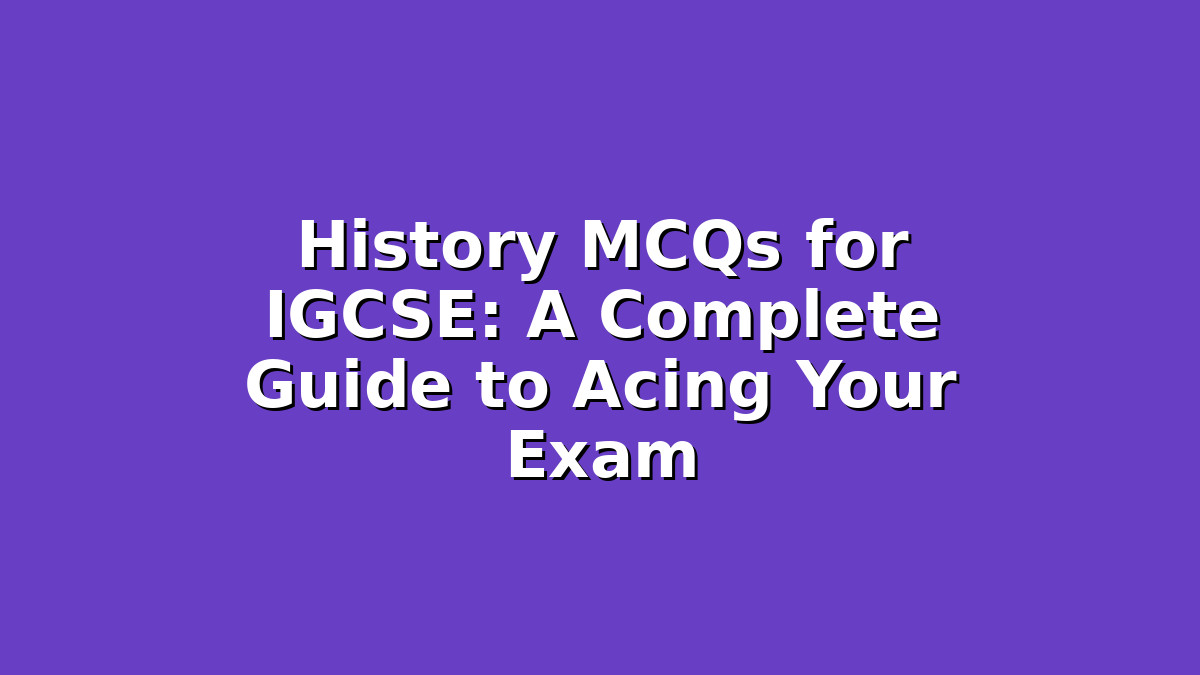Preparing for the IGCSE History exam can feel overwhelming, especially with the vast amount of information you need to learn and remember. Multiple Choice Questions (MCQs) are a significant part of the exam format and can be tricky if you’re not well-prepared. However, with the right strategies and focused practice, you can master History MCQs and boost your confidence on exam day. This guide is designed specifically for IGCSE students looking to improve their exam performance through effective study techniques and understanding how to tackle History MCQs.
Understanding the Role of History MCQs in IGCSE
First, it’s important to understand why MCQs are used in the IGCSE History exam. Unlike essay questions that test your ability to elaborate and analyze, MCQs assess your knowledge recall, understanding of key facts, dates, and concepts, and your ability to distinguish between close answer choices. They are designed to test a broad range of content quickly, focusing on factual accuracy and interpretation.
For students, this means that a strong factual foundation is crucial. You’ll need to familiarize yourself with key events, important figures, causes and consequences of historical developments, and different interpretations of history covered in your syllabus.
Section 1: Building a Strong Foundation for History MCQs
The first step to mastering History MCQs is building a solid knowledge base. Here’s how you can do that effectively:
1. Use the syllabus as your roadmap. The IGCSE History syllabus outlines the topics you need to know. Make sure you have a copy and use it to guide your revision. Break down each topic into manageable chunks and study them one at a time.
2. Create detailed yet concise notes. While comprehensive notes are helpful, MCQs require quick recall, so your notes should be clear and easy to review. Use bullet points, timelines, and mind maps to visualize events and their relationships. For example, a timeline of the causes of World War I can help you remember the sequence and interconnection of events.
3. Focus on key dates, people, and terms. MCQs often test your memory of specific details such as the year a particular event happened, the role of a historical figure, or the meaning of a term. Flashcards are excellent for this. Tools like Quizlet allow you to create digital flashcards and test yourself regularly.
4. Understand cause and effect. Many MCQs focus on why events happened and their consequences. Practice summarizing causes and effects in your own words, and discuss them with classmates or teachers.
Section 2: Effective Strategies for Answering History MCQs
Knowing the content is only half the battle. The other half is mastering the technique of answering MCQs smartly and efficiently.
1. Read the question carefully. Don’t rush. Make sure you understand what the question is asking before looking at the options. Pay attention to keywords like “most likely,” “main cause,” or “immediate consequence.”
2. Use the process of elimination. Even if you’re unsure of the correct answer, you can often rule out one or two options. Narrowing down your choices increases your chances of selecting the right answer.
3. Look out for tricky wording. Sometimes, questions may include negatives, such as “Which of the following was NOT a cause of the Cold War?” or “All of the following happened EXCEPT…” These require extra attention.
4. Manage your time wisely. Don’t spend too long on any single question. If you’re stuck, move on and come back later if time permits. Answering all questions is important since you may get marks for partially correct answers or informed guesses.
5. Practice with past papers and sample MCQs. The more you practice, the better you’ll get at spotting patterns and familiar question types. Exam boards often release past papers, which are invaluable for your preparation.
Section 3: Incorporating MCQ Practice into Your Study Routine
To truly benefit from practicing History MCQs, you need to integrate them into your study plan consistently.
1. Set regular MCQ practice sessions. Dedicate time each week to practice MCQs related to topics you’ve recently studied. This reinforces memory and reveals areas where you need improvement.
2. Review explanations for each question. Don’t just mark answers right or wrong. Understand why the correct answer is correct and why the others are not. This deepens your understanding and helps you avoid repeating mistakes.
3. Track your progress. Keep a log of your scores and question types you struggle with. Over time, this will highlight your strengths and weaknesses, allowing you to tailor your revision accordingly.
4. Use online resources and apps. There are many free and paid platforms offering IGCSE History MCQs. Engage with interactive quizzes, timed tests, and even group quizzes with friends to make studying more dynamic and less monotonous.
5. Stay positive and persistent. It’s normal to get some questions wrong at first. Use mistakes as learning opportunities rather than discouragement. Consistency and a positive mindset are key to success.
Conclusion: Your Path to IGCSE History Success
History MCQs can be challenging, but with a strategic approach, you can turn them into an opportunity to showcase your knowledge and improve your exam scores. Start by building a strong knowledge foundation, apply smart answering techniques, and practice regularly to refine your skills. Remember, preparation is a journey, and every effort you make brings you closer to your goal. Stay motivated, use these tips to guide your study sessions, and approach your IGCSE History exam with confidence. Good luck!

Responses